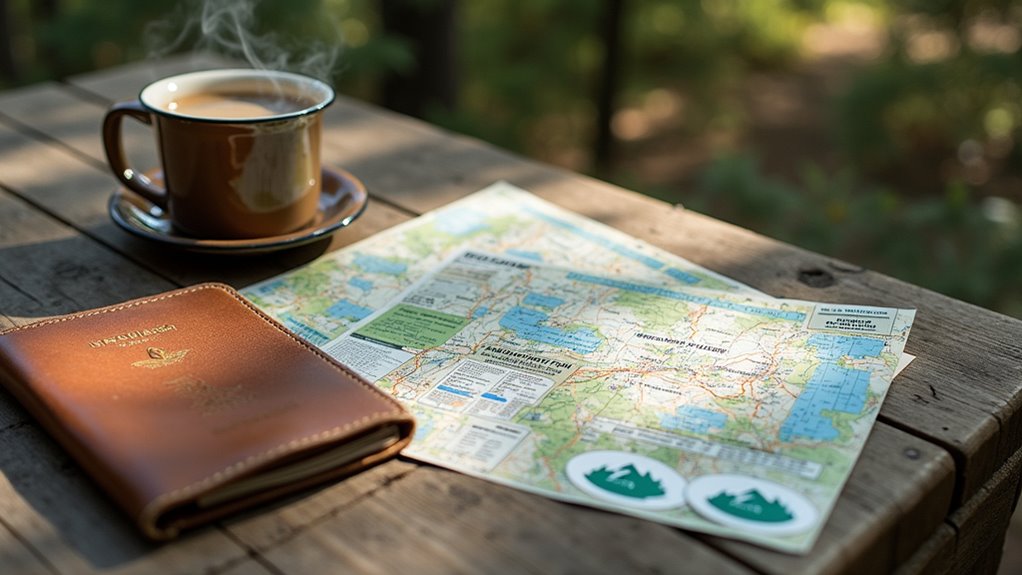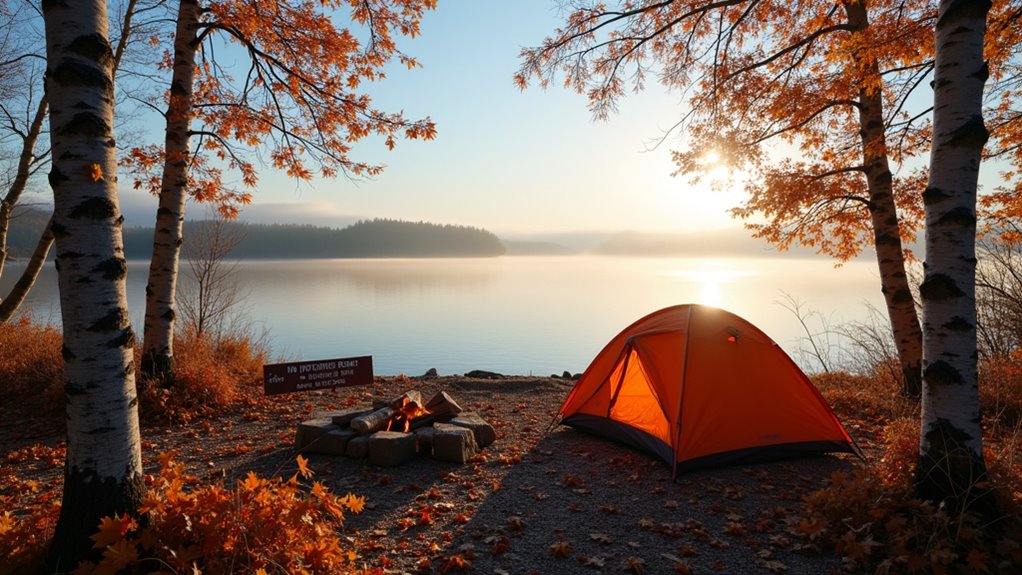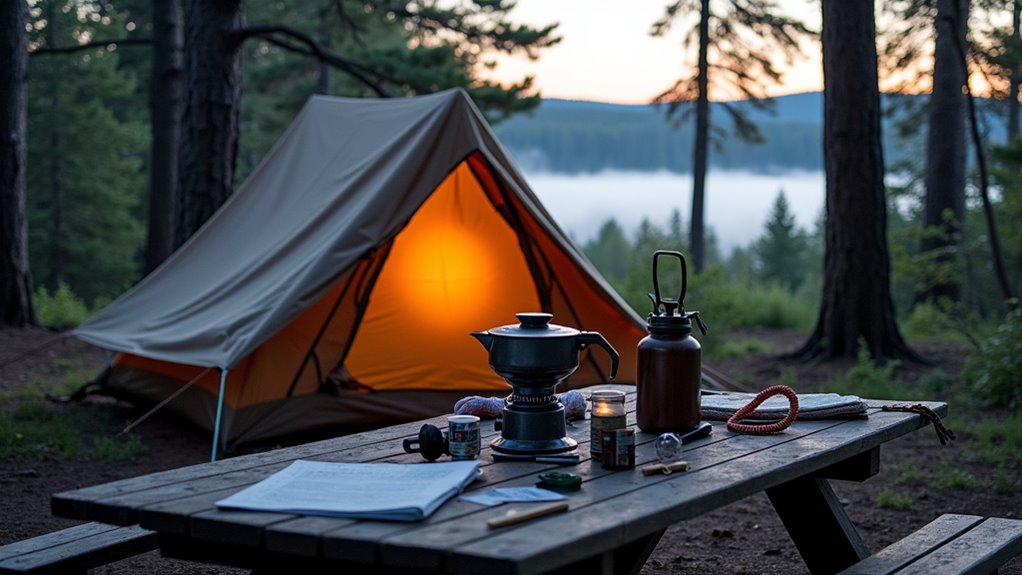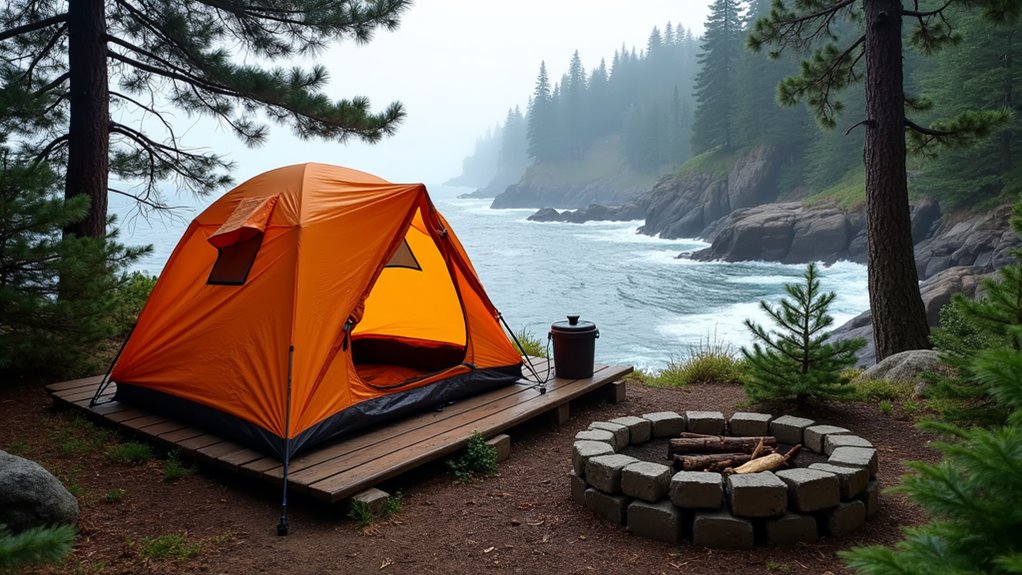Physical Address
304 North Cardinal St.
Dorchester Center, MA 02124
Physical Address
304 North Cardinal St.
Dorchester Center, MA 02124

Transform your Michigan UP camping adventure with essential wilderness tips that protect you while exploring millions of acres of untamed beauty.
Did you know that Michigan’s Upper Peninsula contains nearly 4 million acres of public land, offering over 100 campgrounds for your outdoor adventures? You’ll find endless opportunities to explore pristine lakes, dense forests, and rugged landscapes without breaking the bank. While the UP’s natural beauty draws thousands of campers each year, you’ll need more than just a tent and sleeping bag to guarantee a successful trip. Let’s explore the essential preparations that’ll make your UP camping experience both safe and memorable.

Before heading to Michigan’s Upper Peninsula for camping, you’ll need to secure the proper permits and documentation to guarantee a legal and hassle-free experience.
You must obtain a Recreational Passport to enter Michigan State Parks, and if you’re 18 or older, you’ll need to register your campsite and remain present each night of your stay.
Make your reservations through MiDNRReservations.com or call 1-800-447-2757.
Reserve your Michigan camping adventure easily online at MiDNRReservations.com or by phone at 1-800-447-2757.
Keep in mind that during peak season (May 15 to September 15), you can’t stay more than 15 nights in state parks.
Once you’ve set up camp, don’t leave your site unoccupied for more than 24 hours, or you’ll risk losing your spot.
These rules help maintain fair access and make sure everyone can enjoy Michigan’s beautiful camping destinations.
For those seeking more remote experiences, primitive campgrounds are available in national forests and require specific reservation procedures through Hiawatha and Ottawa National Forests.
With your permits and documentation secured, finding the right campsite in Michigan’s Upper Peninsula can make or break your outdoor experience.
You’ll find diverse options scattered across lakes, rivers, and forests, each offering unique advantages for your adventure. Essential camping items can enhance your experience regardless of the campsite you choose.
Consider your preferred activities when selecting a location. If you’re planning to fish or kayak, look for sites with water access. For hiking enthusiasts, choose spots near trail networks.
Many campsites provide basic amenities like vault toilets and picnic tables, while others offer full facilities including showers and RV hookups. The rustic cabins in Hiawatha National Forest provide an authentic outdoor experience without electricity or plumbing.
Check the site’s proximity to attractions you’d like to visit, such as waterfalls or historic sites.
Remember that state parks require advance reservations through MiDNRReservations.com, while state forest sites typically operate on a first-come, first-served basis.

Timing your Upper Peninsula camping adventure requires careful consideration of seasonal patterns and restrictions.
You’ll find the most comfortable camping conditions during late August and September when temperatures cool down and bug populations decrease. While summer months offer warm weather in the 70s and 80s, you’ll need to contend with mosquitoes and flies, especially in July.
For state park camping, you can book sites up to six months ahead through MiDNRReservations.com, and you’ll need a Recreation Passport for vehicle entry. Many state forest campgrounds operate first-come-first-served. At Fort Wilkins State Park, the west campground loop will be closed through June 2025 for facility upgrades.
When planning, pack layers for unpredictable weather, particularly near Lake Superior. Don’t forget bug repellent for summer visits and warm gear for cool nights. Essential tips for a safe and enjoyable camping adventure can help ensure your trip is both memorable and comfortable.
Check campground schedules, as some locations close temporarily for maintenance or seasonal changes.
Since the Upper Peninsula hosts diverse wildlife including black bears, maintaining proper safety protocols is essential for both campers and animals.
Always store your food in bear-proof containers and keep your campsite clean to avoid attracting unwanted visitors. Don’t approach wildlife, even if they appear injured – instead, contact local authorities. Provide extra space during their mating and nesting seasons to ensure their natural behaviors aren’t disrupted.
Keep food secured in bear-proof storage and maintain a tidy camp. For everyone’s safety, never approach wildlife – call authorities if needed.
To protect the environment, stick to designated trails and follow the Leave No Trace principles. Avoid bug bites by using insect repellent and wearing long sleeves and pants.
When gathering firewood, only use local or certified heat-treated sources to prevent spreading invasive species. Set up fires in designated rings and never leave them unattended.
You’ll also need to manage your water supplies wisely by using designated refill points. These practices help preserve the UP’s natural beauty while ensuring your safety and the well-being of local wildlife.

Packing the right equipment for your Upper Peninsula camping adventure requires careful planning and a detailed checklist.
Consider the region’s unpredictable weather and remote locations when selecting your gear. You’ll need reliable shelter, cooking equipment, and safety supplies to guarantee a comfortable experience. Creating a menu plan checklist will help you efficiently organize meals and reduce unnecessary food items.
Remember to check your equipment before departure and pack extra batteries, as outdoor supply stores can be far between in the UP’s remote areas.
Understanding the rules and regulations of Upper Peninsula campgrounds assures you’ll have a hassle-free outdoor experience.
You’ll need to secure a camping permit and guarantee your campsite doesn’t exceed six people. If you’re traveling with a larger group, you’ll need to reserve group camping facilities.
Your permit requires registration of up to two vehicles, each displaying a park sticker. You can stay up to 15 consecutive nights between May 15 and September 15, but you’ll need to renew your permit by 8:30 a.m. on expiration day.
Keep your campsite occupied, as permits can be revoked after 24 hours of vacancy.
Don’t forget your Recreation Passport for park entry. Keep fires within designated areas, control your pets, and remember that you’ll need permission for non-registered visitors to enter the campground.

With your campsite rules in order, you’ll desire to explore the incredible destinations that make Michigan’s Upper Peninsula a true outdoor paradise.
From natural wonders to historic sites, the UP offers diverse experiences for every budget-conscious traveler.
Packing the right gear is essential for a comfortable and safe camping trip in the UP.
The mesmerizing Lake of the Clouds in Porcupine Mountains Wilderness State Park offers some of the most stunning panoramic views in the region.
These destinations showcase the UP’s natural beauty while keeping your wallet happy, making them perfect additions to your camping adventure.
Before setting up camp in Michigan’s Upper Peninsula, you’ll need to prepare for its dynamic and often unpredictable weather patterns. Pack layered clothing with moisture-wicking base layers, insulating mid-layers, and waterproof outer shells to handle temperature swings from 80°F days to 50°F nights.
Don’t let the summer season fool you – north winds from Lake Superior can trigger sudden cold snaps. Being surrounded by three Great Lakes helps moderate temperature extremes, but conditions can still change rapidly. Essential strategies for cold-weather camping survival can help you handle the unpredictable weather. Choose your campsite carefully, avoiding low-lying areas prone to flooding, and always set up your tent with a rainfly and ground tarp.
Check weather forecasts regularly and establish an emergency plan with clear evacuation routes. You’ll want a sleeping bag rated for your expected lows and an insulated sleeping pad. Store your gear in waterproof bags and keep emergency supplies, including a first aid kit and emergency blanket, easily accessible.
Ready to experience the untamed beauty of Michigan’s Upper Peninsula? With your permits secured, campsite chosen, and supplies packed, you’re set for an unforgettable adventure that won’t break the bank. Remember to check weather forecasts, follow local regulations, and maintain a respectful distance from wildlife. By planning ahead and staying prepared, you’ll create lasting memories while protecting the UP’s pristine wilderness for future generations to enjoy.